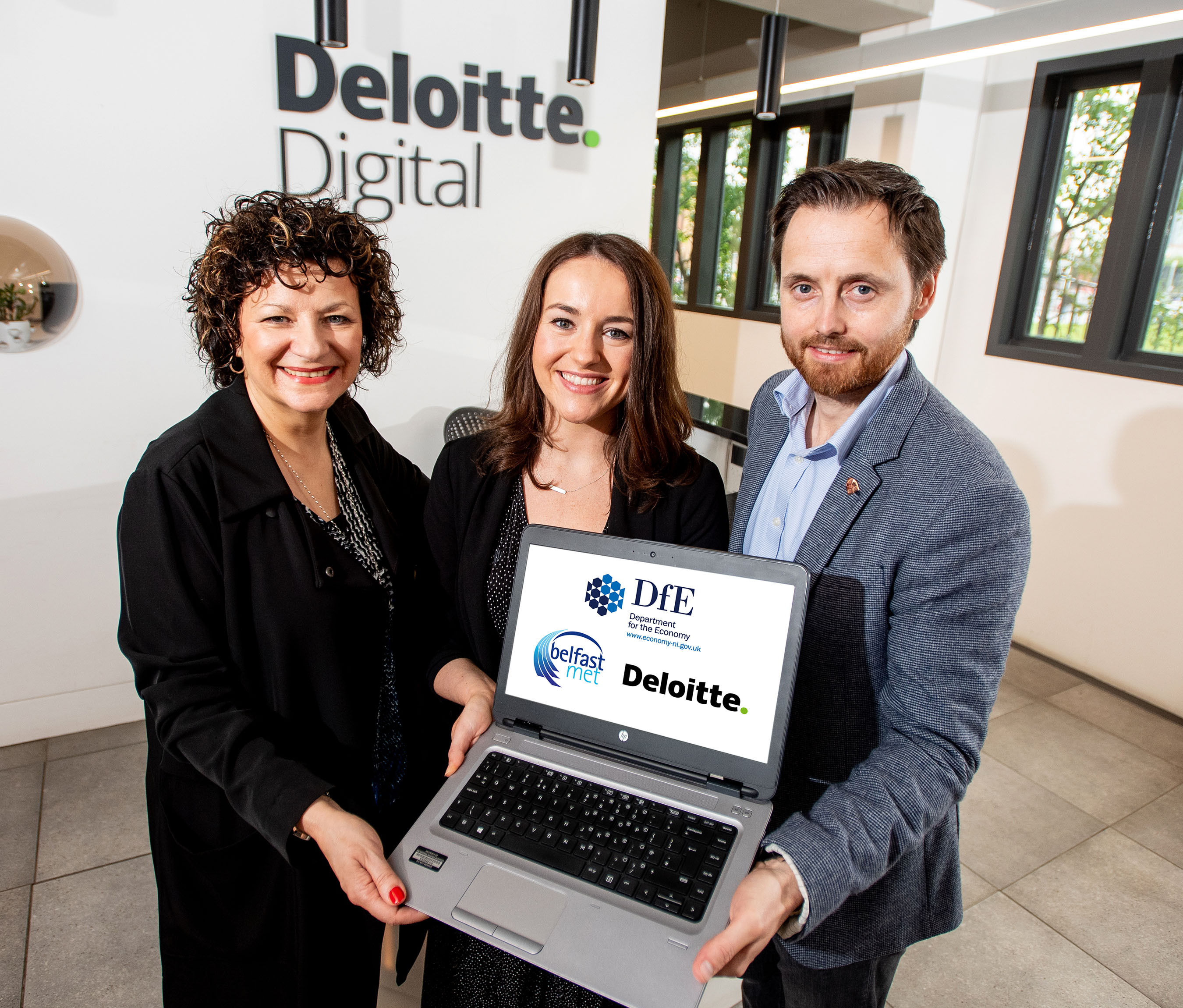Work TV
Watch our TV Channel dedicated to the ‘World of Work’. Explore our video library for informative videos featuring career opportunities at leading companies, franchising opportunities, further education and recruitment professions and their services.
Simon Collyer
Londonderry Port and Harbour Commissioners Seeks Non-Exec Board Members Disabled and Women Encouraged to Apply
Launch of recruitment competition for Londonderry Port and Harbour Commissioners
The Department for Infrastructure (DfI) has announced a recruitment campaign to appoint four Non-Executive Members to the Board of Londonderry Port and Harbour Commissioners.
These key posts offer an excellent opportunity for individuals to make a tangible and valued contribution to the management and continued growth of this important public body.
The time commitment for the post will be approximately one to two business days per month. The Members will be expected to attend all Board meetings and other ad hoc meetings as required. The Members will receive remuneration of £8,552 and reasonable travel and subsistence costs.
The appointments will be effective from 1 October 2019 and will run for a period of four years.
Applications will be welcomed from all sections of the community.
Women, younger people, people with disabilities and people from ethnic minority communities are currently under-represented on DfI Boards. Applications from members of these groups would be particularly welcome.
The application pack can be accessed on www.nidirect.gov.uk/articles/public-appointment-vacancies or www.infrastructure-ni.gov.uk/publications/application-four-non-executive-members-board-londonderry-port-and-harbour-commissioners

Alternatively contact the DfI Public Appointments Unit:
- * In writing at Clarence Court, 10-18 Adelaide Street, Belfast BT2 8GB;
- * By telephone - 028 9054 1049;
- * By e-mail - send your request to publicappointmentsunit@infrastructure-ni.gov.uk
- * Last date for applications is 28 June 2019.
ABC Comment, have your say below:

Plaid Cymru’s Annual Conference in 2019
The organizers say that conferences are always enjoyable, lively affairs where representatives from organizations can attend as executive observers, hold a fringe meeting or main stage debate to set the agenda, or hold an exhibition stand amongst the hustle and bustle of conference attendees.
The conference will be held on October 4th-5th at Swansea Grand Theatre, Swansea.
'Be there or be square' as they say

ABC Note: once we get our broadband in we will be doing a major events page update.
New Deloitte Assured Skills Academy Offering 24 High Quality Training Places for Graduates
A brand new Deloitte Assured Skills Academy is offering 24 graduates the opportunity to gain the skills needed for a career in business consultancy using the latest technology and software.
Funded by the Department for the Economy, the new Enterprise Transformation Academy will deliver nine weeks of industry-relevant pre-employment training at Belfast Metropolitan College, covering the very latest areas in business analysis, project management and market-leading software.
Participants who successfully complete the training will receive a guaranteed job interview with Deloitte.
Highlighting the successful track record of Assured Skills Academies, Ann Williamson, Head of Employer Skills at the Department for the Economy, said: “This new Assured Skills Academy in Enterprise Transformation with Deloitte and Belfast Met will see participants gain valuable training in the very latest business consultancy software and techniques.
“The Assured Skills Academy model has been very successful in providing a pipeline of skilled people to growing local businesses. The Department is continuing to work with local employers and Further and Higher Education providers to develop more Assured Skills Academies in the coming months.”
Ciaran Fitzpatrick, Technology Director at Deloitte, said: “The new Enterprise Transformation Academy is a unique and exciting opportunity for 24 graduates to join a fast-growing and cutting edge team, and be on the forefront of new technology.

“During the academy, participants will receive training across a range of areas, and gain an industry-recognised certification in ServiceNow, one of Deloitte’s key technology alliances and an increasingly important enterprise technology. Applicants don’t need prior experience in business technology consultancy or ServiceNow software. A 2:2 degree in any discipline is all that is required.
“With more than 200 people employed by Deloitte following Assured Skills Academies, this is a proven route for graduates seeking to start a career in business technology consultancy.”
Damian Duffy, Director of Development at Belfast Met, said: “We have been delivering Assured Skills Academies with the support of the Department for the Economy and in partnership with Deloitte, and other companies, for more than eight years. We have trained hundreds of participants and have a strong conversion rate of securing employment for Academy graduates.
“We are pleased to once again be providing training in the very latest business consultancy techniques and look forward to welcoming the next cohort of successful applicants.”
Participants on the Academy will receive a £150 weekly training allowance, be reimbursed travel expenses and may be eligible for childcare allowance.
Applications for the Deloitte Enterprise Transformation Assured Skills Academy are open until Friday 28 June 2019. Applicants must have a minimum 2:2 degree in any discipline and no experience is required.
For more information and to apply visit http://www.nidirect.gov.uk/assuredskills
ABC Comment, have your say below:

Lloyds Bank Social Entrepreneurs Programme
We are at Suffolk University today to take part in a selection session for the Lloyds Bank Social Entrepreneurs Programme in conjunction with School for Social Entrepreneurs business school.
Ipswich waterfront took a huge knock in the Great Recession, but the improvements here are most impressive. Lots of new businesses have opened up in the waterfront area and lots of new boats in the marina.
We are in the new Atrium building ... not far we might add from the famed, Ipswich Football Club

Image: The University of Suffolk Atrium Building.

Image: The University of Suffolk.
ABC Comments, have your say below:

DWP Advertising Dressed Up as Editorial
The ABC has turned down the opportunity to work with the DWP Work Programme and Work & Health Programme (WHP).
The Work and Health Programme helps you find and keep a job if you’re out of work. It’s voluntary say the DWP, unless you’ve been out of work and claiming unemployment benefits for 24 months. The DWP want organisations to identify refer and support people they think will benefit from the WHP but may have limited contact with Jobcentre Plus.
We felt this was more to benefit the DWP than those eligible and we decided to pass on that opportunity.
We have not ruled out working with the DWP in future, but their track-record and reputation regarding the treatment of disabled people is not something we want to get tarnished with. Sorry to the WHP team ... we will have to pass on that one.
We don't have the resources we might add, to do more voluntary work. We do tons already.
Meanwhile:
The Disability News Service has sent a call out to all members and supporters regarding the DWP universal credit uncovered advertorials that are running in the Metro newspaper currently: https://dpac.uk.net/2019/05/callout-to-supporters-to-dump-the-metro-dumpmetrodwplies/
Advertising dressed up as editorial comment is something that really gets us media types annoyed. Advertorial can be very good, but our audience needs to know where they stand. The conventional media such as newspapers are seeing falling circulation and lower advertising spending. At the ABC ours is going up. If people want facts based editorial - at the ABC we do the very best we can to provide it. We are not on anyone’s payroll. We are not paid to kiss anyones arse.
ABC Comment, have your say below:

ABC Summer Newsletter Can Be Downloaded NOW!
The ABC newsletter is out now. You can download it below.
You can see some of our wonderous activity and get up to speed with the latest ABC goings on.
We do not sit on our hands at the ABC - more than we can say about others...!!
Still no news from the 'hairy wonder' and his Virgin Media. No so much Virgin Zoom, than Virgin 'Phut Phut'. We placed an order on April 2nd and moved on May 2nd. We are still waiting to have a date for a Virgin installation. We have had little communication from Virgin … the lady from the complaints department said she would ring back at a better time and didn’t.
Where do you go to complain about the Virgin complaints department? The complaints department, department we imagine!

Amusingly a leaflet in our old base delivered by a Virgin salesman brags of how the area is geared up to receive Virgin broadband. Hmmmm...

Image: Sir Richard Branson, he may be happy but the ABC is not.
ABC Comment, have your say below:

The ABC Summer Newsletter 2019 - can be downloaded below:

How to Save On Car Insurance
The ABC were given a tip from an insurance company today.
If you insure your car immediately you will pay a higher price for your car insurance.
If you insure your car starting in seven days’ time an advisor told us you can make a substantial saving. Interestingly waiting thirty days makes no difference, in the example we tried.
Keeping a car on the road at all while on a low income is a challenge, yet a car is the route to work and an essential item in rural parts.

ABC Comment have your say below:

Amber Rudd Key Note Speech at the Recruitment and Employment Confederation
Introduction
It’s a huge pleasure to be here at the Recruitment and Employment Confederation.
At first glance the world of work resembles the last century, superficially. Offices, shops and warehouses. Teachers and taxi drivers.
But as soon as you scratch the surface, as soon as you stop to think, you realise what we have today is nothing like the labour market I entered in the 1980s.
I remember when my trading team acquired a single, comically large mobile phone, which one of us took home each night in order to contact Japanese markets at 2am.
Now, thanks to globalisation, digital technology, automation and connectivity, the world is being transformed.
And there are huge opportunities for all of us: new and flexible ways of working, better services, and more inclusivity.
Today I want to celebrate the successes of our labour market, but I also want to talk about what else we can do to improve it.
This is a period of significant change.
And government cannot predict with certainty what will happen next, I don’t think anyone can. But we can prepare.
Where we’re at
Fortunately we start from the enviable position of having a buoyant jobs market, and not just for former Chancellors.
Participation in the labour market is at record levels, with over 32 million people in work and the employment rate as high as it has ever been.
We have the most diverse workforce ever, with more women, disabled people and those from ethnic minority backgrounds in work, bringing financial independence, purpose and confidence to millions of people who were previously sidelined.
And since this government has been in office, over 3.6 million more people have entered work, on average over 1,000 people a day. Our unemployment rate is now less than half the Euro area average.
Thanks to the good work of the Chancellor and former Chancellor, we not only weathered the storm, we got the deficit under control, kept taxes as low as possible, invested in national infrastructure and supported entrepreneurs. All of which provided the bedrock for our jobs success.
That success is also a testament to the collective intelligence of the millions of people, who work every day to improve their lives, their communities, and their businesses.
Because the State is not there to direct, corral or force economic activity.
It cannot compel businesses to create a specific number of jobs, in areas or industries determined by a central command unit.
That approach failed in the 20th century and is, frankly, totally implausible in the 21st century.
Indeed, the government’s role is to create conditions for people and businesses to succeed, and crucially, to create a social security system that will support them if they fall.
What we face now
That is the only way to embrace both the opportunities and the challenges of the modern labour market.
The pace of change in the world around us will only increase. The digital revolution and a world of 24/7 connectivity and consumption continue to tear at the 9 to 5 rule book.
Globalisation is expanding the supply of labour, while automation and artificial intelligence simultaneously disrupt the demand for it.
Overall I am enormously optimistic about the opportunities on offer, but nobody can ignore the challenges that do, and will exist.
Every day we see new reports in the paper that 10, 20 or 30% of people may lose their jobs to robots – yes, even MPs!
Hard working men and women can return home on a Friday, not knowing what shifts they’re working the following week, let alone the following month.
Or still find it difficult to make ends meet when their hard earned pay cheque comes in.
And too many people still face barriers to work, due to age, sex, race or disability.
I understand that the certainty of the old industries, of guaranteed jobs for life, offer an attractive nostalgia. But harking back to the dark satanic mills of the past is not the solution.
We can’t stop the clock, even if we wanted to.
And history shows that we can be positive.
This is not the first Industrial Revolution; all the evidence from the past is that automation and technology can be hugely disruptive, but the role of labour evolves, it is not obliterated.
In the Nineteenth Century, blacksmiths were replaced by railwaymen. It was not an easy transition, but ultimately the productive value of labour increased, and an explosion of commerce and communication followed.
No one looks back now and thinks: I wish the Luddites had won.
And we can already see the same opportunities in the Fourth Industrial Revolution.
Automation is driving the decline of banal and repetitive tasks. So the jobs of the future are increasingly likely to be those that need human sensibilities, with personal relationships, qualitative judgement and creativity coming to the fore.
And there is a great, clear role for government to help people take advantages of these changes, and to help businesses create high quality jobs.
So today I want to focus on three key principles at the heart of our labour market strategy for the 21st century, access, opportunity and protection.
First, better access – so everyone who can work is able to get that vital first job, wherever they live and whatever their background.
Second, better opportunities to succeed and progress in work – we don’t just want people to get a job, we want them to get a good job, with opportunities to progress.
Third, better protections for those who will struggle to manage these changes. We need a safety net and a springboard to support people as they navigate the changing labour market.
Better access
The first plank of our strategy is building a society where everyone who can work has access to a job.
First and foremost this requires a strong economy, because jobs are created when businesses succeed. Under this government, over a million businesses have been created since 2010.
But obviously it is not enough just to manage the economy we have. We must also prepare for the changes that it will face.
The government’s Industrial Strategy sets out an ambitious, long term vision to make us the world’s most innovative economy – future-proofing our jobs market so we can be at the forefront of emerging industries.
Second, we need to make sure that people can access jobs wherever they live.
Underpinning this is infrastructure: enabling workers to reach new job opportunities.
This is at the heart of government’s £2.5 billion Transforming Cities Fund, opening up labour markets through improved transport connections in some of England’s largest city regions.
Additionally, our £1.6 billion Stronger Towns Fund will help spread opportunity and growth to places that have felt left behind.
And third, we need to make sure that nobody is locked out of any job because of their age, ethnicity, disability or sex.
That is why I have also consistently championed initiatives, in my department and beyond, to improve labour market access for these groups.
And we are making good progress.
Employment rates for women, and for ethnic minorities overall, have never been higher.
Employment of people aged 50 and over is up 1.9 million since 2010. And the number of disabled people in work has increased by over 900,000 in the last 5 years.
But we know these groups still face disproportionate barriers to work, ranging from practical issues like childcare or accessibility, to straightforward discrimination.
So for the next stage of labour market growth, my department is focusing on how to drive up participation for these under represented groups.
We are providing tailored services for ethnic minority jobseekers: for example, rolling out mentoring circles with national employers, which offer specialised support to build confidence and raise aspirations. Thanks to the work of my colleague, the Minister for Employment, these services have been a success locally and are now being expanded to all young claimants, irrespective of their background, across the country.
At the end of 2018 we celebrated 10,000 employers signing-up to our Disability Confident scheme, in order to empower their recruitment, retention and development of disabled employees. This is a great start, but we want to double Disability Confident membership to 20,000 over the next year. As our stakeholders tell me, this country has some way to go to develop a genuinely ‘disability confident’ labour market, economy and society. Our long standing partnership with the Recruitment and Employment Confederation has resulted in some excellent work to challenge businesses to reform their recruitment.
We will shortly consult on reforming Statutory Sick Pay, in order to better support employers to retain staff who experience health problems.
The current system is failing to support those who fall ill in work, one of several factors causing older people to choose retirement when they still have a huge amount to offer. One in 4 men, and 1 in 3 women, have not worked for at least 5 years before they reach State Pension age.
This is a lose–lose situation; employers lose the skills and experience of those workers, and employees miss those vital extra years of earning and saving which could boost the quality of their retirement.
With forward thinking in mind, in February we launched our mid life MOT campaign. We want to encourage people to take stock of their situation in middle age, and consider their skills, finances and health to make realistic decisions for later working life.
We have already removed the Default Retirement Age to open up fuller working lives, and extended the right to request flexible working, which is of particular importance to anyone, of any age, with caring responsibilities.
For many women, we know that caring responsibilities can be a huge barrier to work.
Over the last few months, we have been trialling more flexibility for parents submitting their UC childcare claims. Following a successful pilot, we are now updating our guidance, so Work Coaches can use more discretion to support parents’ claims for this essential service.
Jobcentres can also use their Flexible Support Fund to pay the up front childcare costs of those moving into work, bridging the gap to a parent’s first pay cheque.
Of course we need to do more, and my department will continue to trial new approaches, looking for innovative ways to support people to enter the labour market.
More opportunity
But it isn’t enough to just have any job, we want people to have good jobs.
And there are concerns that the new ways of working and new technology could, for some, lead to worse jobs.
As consumers, we all know the instant benefits that app services can deliver to our lives.
Young people, who would never use taxis, don’t think twice about ordering an Uber, I know, I am a parent to 2 good examples.
However, there are fears that for employees, the gig economy could objectify labour to a point where their working lives are subordinate to an unthinking algorithm.
That is why the Prime Minister commissioned Matthew Taylor to complete an independent review of modern working practices. And the Secretary of State for Business was right to accept the vast majority of his recommendations in the government’s Good Work Plan.
These are now being put into practice, and we are also taking additional steps, such as from this month, zero hours contract workers are now entitled to payslips by law.
The government’s approach will always be to maximise the benefits of this type of work, whilst protecting those who could be vulnerable to abuse in the real time, demand led model.
Of course, working practices aren’t the only issue. Pay also matters.
We know that of those workers low paid in 2006, just one in 6 had escaped that earnings bracket a decade later.
Women, in particular, often move into part–time work to accommodate family responsibilities; they can get stuck in low paid positions, with limited chance of progression.
So the government has already introduced the National Living Wage, now £8.21, which provided the biggest pay rise for low paid workers in over 20 years.
And we want to go further. The Chancellor has already announced our aspiration to end low pay, and there is also more we can do in DWP.
When the move to Universal Credit is complete, around half of claimants will be in work.
More people than ever before will be engaging with my department, and we have a huge opportunity to leverage the skills of our Work Coaches to build relationships and find innovative ways to support progression.
We have already completed a large scale trial, looking at whether Work Coaches could help in work claimants to get a pay rise. We gathered a huge amount of data, but we need even more evidence to understand what really works.
So today I can announce two further projects.
First, building our ability to help claimants make good decisions about job switching.
We know that changing jobs is often the best way to open up new opportunities and take-on more responsibility, but it can come with risks. This project will help us understand how we can assist workers to make informed decisions about new opportunities.
Second, boosting the capability of our employer-facing staff to have effective conversations with local employers about progression and good quality flexible working.
Because this isn’t a problem that any department, or indeed government, can tackle alone.
Progression relies on employers creating higher value jobs. So I want to listen to businesses’ views, because you are the experts in how your employees can be supported to achieve their potential.
There are some great examples of this happening already. Organisations like Timewise, who work with small, medium and FTSE 250 companies, to create not just jobs, but career paths for those who require flexible working.
And this approach is starting to become more mainstream, with employers like Lloyds Banking Group and Ernst & Young wholeheartedly embracing flexible working practices, and the positive and productive culture that accompanies them.
So my department will shortly be approaching academics, researchers, employers and others, to work with us to gather evidence and generate ideas for a fresh approach.
I have already begun discussions with the Trades Union Congress and the Confederation of British Industry on how we can take this work forward.
I want to build a clearer picture of how and why people progress in work, and what we, the government, can do to support them as they do that.
More protections
Because in this era of change it is our responsibility to protect people, by helping them manage the transitions they face as work evolves, and working lives expand.
Through Automatic Enrolment we have transformed pension provision, bringing more than 10 million workers into workplace pension saving since 2012.
But we also need to build a safety net that supports people effectively during their working lives, one that can particularly help those who find themselves temporarily displaced.
Universal Credit is a modern, 21st Century welfare system, using responsive technology to measure a claimant’s income in real time, to automatically calculate and award them their benefits.
It has a massive role to play by providing better security and incentives for people trying to get jobs and build careers.
Under the old system, coming off welfare into an entry level low paid job often led to a net loss for claimants. UC is based on the principle that work will always pay more than being on benefits.
And Universal Credit offers a new level of personalised support. Claimants have access to a dedicated Work Coach who builds an understanding of their needs and strengths, to offer them the best possible advice and opportunities. Claimants also have more options to interact with the jobcentre, online, by phone or in person.
And at the heart of this support is an agreement that the claimant commit to certain activities to improve or maintain their employment prospects, such as looking for work or doing work experience.
However, I want to ensure that the penalties for not meeting these conditions are proportionate, particularly for the most vulnerable.
So I am announcing today that I will end financial sanctions for welfare claimants that last for 3 years.
Such sanctions were rarely used, but I believe they were counter productive and ultimately undermine our goal of supporting people into work.
In the future, the longest length of a sanction will be 6 months.
And I am undertaking an evaluation of the effectiveness of Universal Credit sanctions, to consider whether other improvements can be made.
Of course, this time of change demands other measures that complement a reformed welfare safety net.
We will need to help people find new roles and build new careers, providing a springboard to help them harness their talents and adapt to the changing market. And we cannot expect the school system to pick up the slack, two thirds of 2030’s expected workforce has already left secondary education.
So learning has to be a lifelong endeavour. This government is creating new Institutes of Technology, rolling-out T–levels in 2020, and will soon publish the Augar Report on the best ways to support Further and Higher education.
The National Retraining Scheme is at the heart of this work. Developed by the Department for Education with other stakeholders, this service will help workers prepare for technological change and automation, by learning new skills to find better work.
This is a complex brief, but I know that colleagues across government, in partnership with the TUC and CBI, are working to ensure we build a service that meets the needs of workers and businesses.
Conclusion
I don’t underestimate the challenges ahead. Jobs are being made, remade and reshaped every day, as we find new ways to be useful to one another.
But I remain incredibly optimistic about what we can achieve.
Seemingly every month now, we celebrate a new employment record.
Commentators rightly talk about it being the great success story of this government.
Indeed it is.
But sometimes we lose sight of why these figures are so important.
They are important because being in a job gives a person dignity, the opportunity to dream big, to earn their own money, pay their own way, determine their own future and set a positive example to their family.
And for many people a job is even more than these things, it is a calling in life.
But I know too, for many, that a job doesn’t always meet every hope and dream. And just because the world of work is changing, does not mean standards and fulfilment should.
Some people do not progress in the way they’d like, their wages don’t rise as fast as they’d wish or they see opportunities slip away by not having the skills or confidence to reach for those goals.
As we progress towards the 100 year life, as the economy transforms around us, we know that multiple career changes are likely to become the norm.
Changing career, perhaps several times, in the midst of working life can be daunting - particularly if you have a family to look after. I know – that’s the path that I took.
The work we are doing across government, and particularly in my department, is designed to support people through this. Because while I know that being in a job is so much better for you, I also know that getting into work should be the beginning of your journey and not the end of it.
From Universal Credit, to Mid Life MOTs and the National Retraining Scheme, we are building a modern system of social and career support, one that is designed for the 21st century labour market, with every single worker in mind.
<end>
ABC Comment, Have your say below:

Universal Credit and Child Benefit Payment Dates For Late May Bank Holiday 2019
This is when you should get paid over the bank holiday weekend.
Universal Credit
Due date: Friday May 24, paid as normal on Friday May 24
Due date: Saturday May 25. Payment date is a day earlier on Friday May 24
Due date: Sunday May 26. Payment date is two days earlier on Friday May 24
Due date: Late May Bank Holiday Monday May 27. Payment date is three days earlier on Friday May 24
Due date: Tuesday May 28, paid as normal on Tuesday May 26. (Note that even though the previous day is a bank holiday with no DWP staff working, payments are automated and will still go into your account at their usual time on Tuesday.)
Child benefit
These are the important dates:
Due date: Friday May 24, paid as normal on Friday May 24
Due date: Saturday May 25. Payment date is a day earlier on Friday May 24
Due date: Sunday May 26. Payment date is two days earlier on Friday May 24
Due date: Late May Bank Holiday Monday May 27. Payment date is three days earlier on Friday May 24
Due date: Tuesday May 28, paid as normal on Tuesday May 26. (Note that even though the previous day is a bank holiday with no DWP staff working, payments are automated and will still go into your account at their usual time on Tuesday.)
If you don't receive your Universal Credit
if you don't get your payment, call the helplines listed below.
But note that you won't be able to speak to benefits staff on the Saturday or the Bank Holiday Monday.
Helpline numbers for UC are as follows:
Telephone: 0800 328 9344 (this replaces the old number 0345 600 0723)
Welsh language: 0800 012 1888
Textphone for those with hearing problems: 0800 328 1344
Call between 8am and 6pm, Monday to Friday (closed on bank holidays).
ABC Comment, have your say below

DWP Minister Amber Rudd Desperately Attempts to Discredit Damming UN Poverty Report
In response to UK work and pensions secretary Amber Rudd's claim that he did not do enough research and was biased in his final report on poverty in the UK, the Special Rapporteur on extreme poverty and human rights, Philip Alston, said today:
"Rather than addressing the substance, the UK government has sought to distract from the troubling findings of this report by misrepresenting the process behind it. This is disappointing, if predictable. In addition to my 12 day visit at the invitation of the government, my report is based on months of preparation by me and my team, including more than 100 consultations, an analysis of over 300 submissions, and more than 100 citations to the government's own data and that of renowned UK institutions. I traveled the country meeting with people in poverty, prominent researchers, and frontline staff at foodbanks and advice centers, many of whom said they wished the government would do the same. The government had an opportunity to review the report ahead of publication, yet made only eight minor changes. The UK is happy to use human rights to criticize other countries, but it must also reckon with its own human rights problems."
The Special Rapporteur's final is available here: https://undocs.org/A/HRC/41/39/Add.1
The press release is available here: https://www.ohchr.org/EN/NewsEvents/Pages/DisplayNews.aspx?NewsID=24636&LangID=E
Mr. Philip Alston (Australia) took up his functions as the Special Rapporteur on extreme poverty and human rights in June 2014. As a Special Rapporteur, he is part of what is known as the Special Procedures of the Human Rights Council. Special Procedures, the largest body of independent experts in the UN Human Rights system, is the general name of the Council's independent fact-finding and monitoring mechanisms that address either specific country situations or thematic issues in all parts of the world. Special Procedures' experts work on a voluntary basis; they are not UN staff and do not receive a salary for their work. They are independent from any government or organization and serve in their individual capacity.
Follow the Special Rapporteur on Twitter @Alston_UNSR and Facebook at www.facebook.com/AlstonUNSR

Image: Prof Phillip Alston, gets out and meets the people.
























